June 22, 2004: Headlines: Congress: Legislation: PCOL Exclusive: Report from the Senate's Peace Corps Safety Hearings
Peace Corps Online:
Peace Corps News:
Library:
Peace Corps: Legislation :
Legislation:
June 22, 2004: Headlines: Congress: Legislation: PCOL Exclusive: Report from the Senate's Peace Corps Safety Hearings
Report from the Senate's Peace Corps Safety Hearings
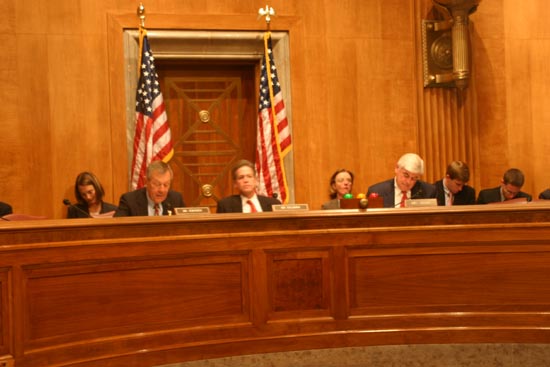
Read and comment on Peace Corps Online's exclusive coverage of the Senate hearings on Peace Corps Safety and Security held on June 22. Read and comment at:
Report from the Senate's Peace Corps Safety Hearings*
* This link was active on the date it was posted. PCOL is not responsible for broken links which may have changed.
Report from the Senate's Peace Corps Safety Hearings
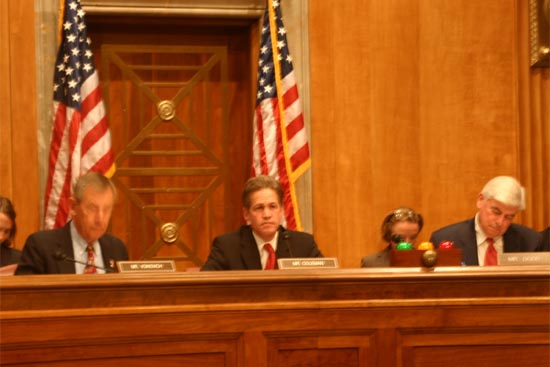
Senators Voinovich, Coleman, and Dodd at the Peace Corps Safety Hearings
The Peace Corps Safety Hearings took place on June 22, 2004. Senator George V. Voinovich (R - Ohio) (left in photo) , Norm Coleman (R - Minnesota), and Chris Dodd (D - Connecticut) attended the meeting.
The hearings began at 930 am in Room 419 of the Dirksen Office building and lasted about two hours.
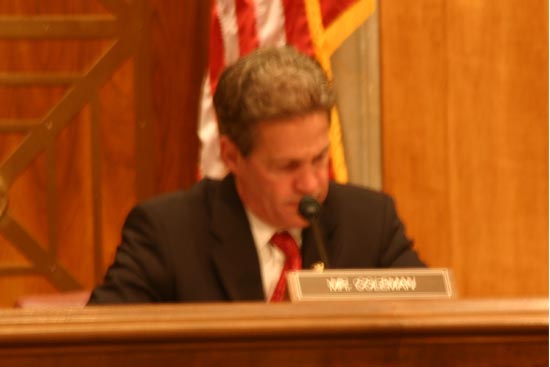
Senator Norm Coleman presided over the hearings
It is the first time the Senator has presided over an open hearing about the Peace Corps since he was elected to the Senate in 2002 and became Chairman of the Senate Subcommittee that oversees the Peace Corps.
Senator Coleman was very knowledgeable about the Peace Corps, the proceedings were well run, and the hearings were very informative and productive.
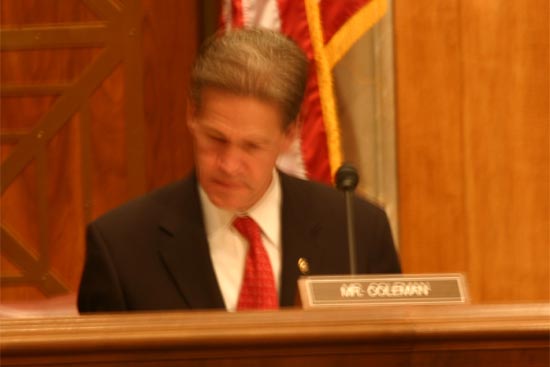
Senator Coleman's Opening Statement
Senator Coleman opened the hearings by talking about the Peace Corps and how he supports the goal of doubling the size of the Peace Corps.
In his opening statement, Senator Coleman said "Let me state from the outset, I believe the Peace Corps is American diplomacy at its best."
"In a world where America is too often misunderstood, the Peace Corps represents an opportunity to show the compassionate nature of this country and its citizens. Now more than ever we need the Peace Corps to continue fostering international goodwill at the grassroots level."
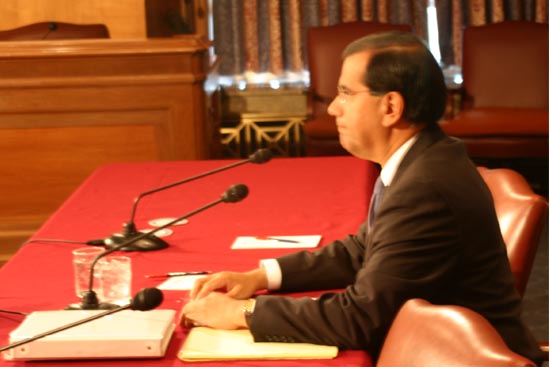
Director Vasquez's Opening Statement
Peace Corps Director Gaddi Vasquez made his prepared statement and talked about what had been done to promote safety and security since he became Peace Corps Director.
"Peace Corps is now pursuing the strongest growth possible within the constraints of our resources preserving the quality of the Peace Corps Volunteer experience and focusing on safety and security."
"While the Peace Corps will never be able to issue an absolute guarantee of volunteer safety, we remain committed to developing optimum conditions for a safe and fulfilling experience for every Peace Corps Volunteer."
"Peace Corps Safety and Security is fully integrated into all aspects of volunteer recruitment, training, and service with an emphasis with volunteers taking personal responsibility and integrating into communities."
"Information provided thorughout the recruitment and application process all include the message that being a volunteer involves risk, volunteers are expected to adopt safe lifestyles, and that the Peace Corps has an effective support system in place."
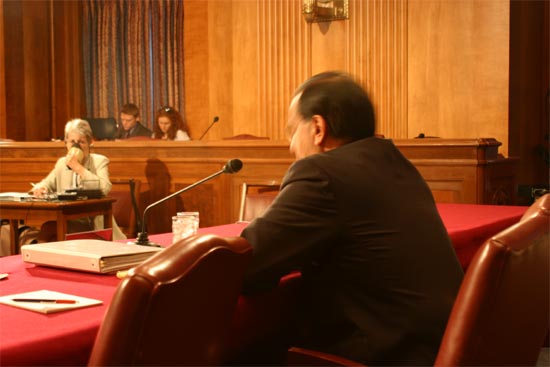
Dirctor Vasquez talks about the five-year rule
Then the Director talked about the five-year rule and noted that the Congress had passed a law in February 2003 giving him the authority to exempt certain positions in safety and security from the five year rule and that so far he had selected 23 exempt positions.
"Last month the Peace Corps contracted with outside experts to perform and objective and independent analysis of the Peace Corps work force incuding the office of Inspector General."
"At the conclusion of the consultant's review I will make further decisions about any other appropriate exemptions for personnel related to safety and security."
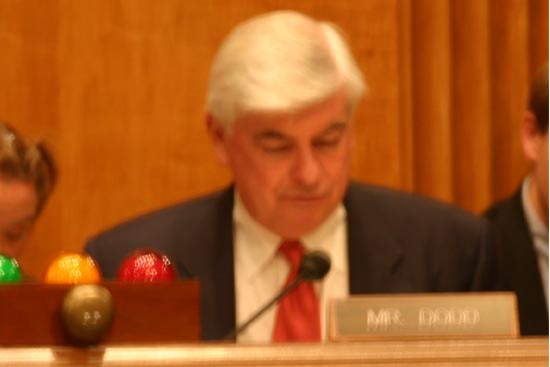
Senator Dodd's Opening Statement
Senator Chris Dodd made his opening statement and talked about his years as a Peace Corps Volunteer in the Dominican Republic and said that his years in the Peace Corps had had a lot to do with his decision to enter public life.
"There has never been a moment in our history when the Peace Corps' objectives were more urgent. Indeed our lack of understanding about other cultures and languages and the misperceptions that others have about our country have contributed to some of the highest rates ever of anti-American sentiment around the globe."
"That is why we must remember now more than ever why the Peace Corps is so important because the Peace Corps Volunteers not only help those in need but also build bridges of understanding and good trust."
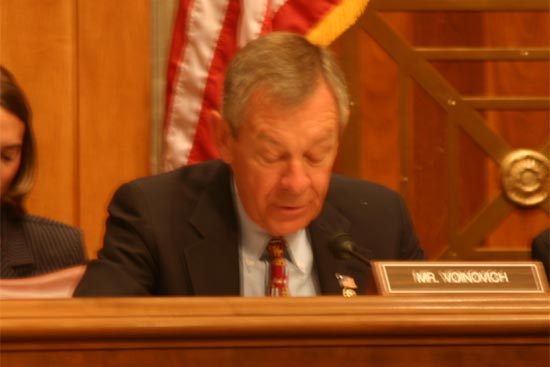
Senator Voinovich's Opening Statement
Senator Voinovich made his opening remarks and talked about the in-depth report from the Dayton Daily News and how the reporters spent more than two years interviewing 500 people.
"Their findings raise serious questions about Peace Corps safety and security and have compelled us to look close at measures in place to ensure the security of our volunteers. They have also led us to discuss ways we might enhance these measures."
The Senator then talked at length about the disappearance of Bolivia Volunteer Walter Poirier III.

Director Vasquez talks about the Dayton Daily News series
Director Vasquez said he had read the articles in the Dayton Daily News but mentioned that the majority of incidents that had been in the articles preceded his time including Mr. Poirier.
He also mentioned that in his view there had been some distortions in the articles. As an example, he mentioned a statement that a volunteer in service dies every two months.
"The fact of the matter is that I have been Director of the Peace Corps for over two years and every loss of life is tragic, but to represent that a volunteer dies every two months when in my time three volunteers have died in service is a bit of a distortion, a bit of a misrepresentation."
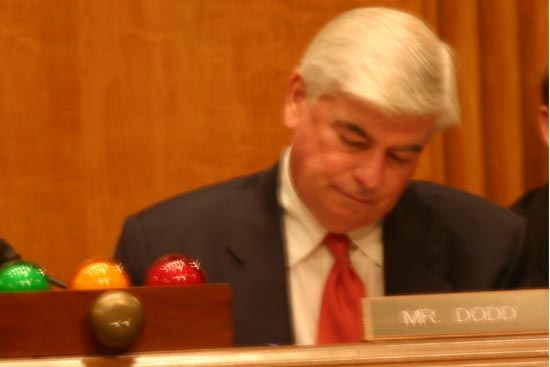
Senator Dodd asks about the five-year rule
After a few more questions, Senator Dodd said that Senator Sarbanes had asked him to enter a statement by Hugh Pickens, Editor of Peace Corps Online, on the five-year rule and Senator Dodd asked that the statement be entered into the Subcommittee record without objection.
Without objection Senator Coleman entered the statement in the Subcommittee record.
Both Senator Dodd and Senator Coleman then asked the Director to talk about the five-year rule in more detail.
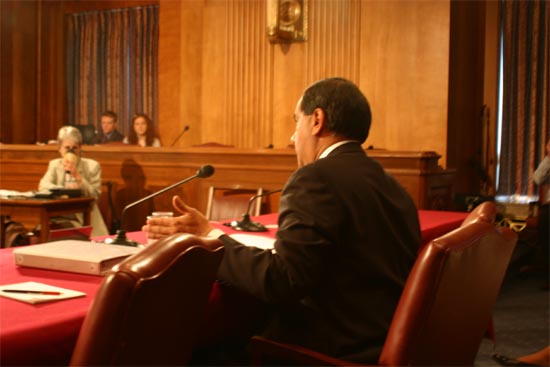
Director Vasquez talks about the five-year rule
Director Vasquez said that "two years ago in our appropriations bill, language was included that authorized the Director of the Peace Corps to exempt employees who worked in safety and security from the five year rule."
"Conceptually the five year rule has been viewed as a way of generating turnover or rotation that keeps the agency some would describe it as fresh, energized. It minimizes the chances of an entrenched bureaucracy from taking hold and thereby minimizing the possibility of affecting the creativity that makes the Peace Corps such a unique agency."

Director Vasquez elaborates his views on the five-year rule
"However, the five-year rule, as I have said to some folks, I have said that I wake up some days and think that it is terrific and some days I wake up and I think that it could use some changes because what you do lose in the process is institutional memory, some continuity, and in fact in some cases, you lose talent because you lose some candidates who do not come to work for Peace Corps because they do not want to be bound by limitations of service."
"So with safety and security, what we did is conduct an evaluation and identify 23 positions that we know to be fully dedicated to volunteer safety and security. Those positions have now been cleared and are exempt from the five-year rule."
"The second wave gets a little more complicated and that is why in my testimony I pointed out that we have retained a consultant to do an evaluation to make some recommendations on what the second group should be of those who should be exempt from the five-year rule."
"Is it someone whose job is 20% safety and security? Is is 30%, 50%, 60%? We need some clarity on those kinds of issues so we are conducting that evaluation and as soon as that report is available, it is my intent to review and where appropriate approve those positions."

Senator Coleman asks Director Vasquez to keep the Senate posted on the study
Senator Coleman asked the Director to "please keep us posted on the progress of that study and forward us that information as soon as possible."
Senator Coleman asked the Director about women in the Peace Corps and if it would make sense to have self-defense training for women during training for the Peace Corps.

Director Vasquez discusses his views on self-defense versus crime prevention
Director Vasquez said that he had experience in this area because in the past as a law enforcement official he had designed a program for high school girls and how they can increase their personal safety.
He said that what he taught them was not self-defense but crime prevention.
He said that emphasis needs to be on crime prevention because it requires a high degree of skill to be able to defend yourself effectively and it is preferible to avoid the crime in the first place.

Senator Dodd gives his views on the five-year rule
Senator Dodd talked about the five year rule and said the Director didn't have to comment but that "I am a strong supporter of the five-year rule. Obviously we have made exemptions to it. Loret Ruppe Miller is one example when she served eight years as Director of the Peace Corps and did an incredible job."
"I am not rigid about the rule but I always like the presumption to be in favor of the rule and you really have to make a strong case to overcome that presumption."
"There is a concern that has been raised, that if you begin to expand this [exemptions to the five-year rule], you can end up with an entrenched bureaucracy in the agency."
"The vitality of the Peace Corps is due in no small measure ...to the fact that there has been this turnover every five years that gives the Peace Corps a lot of its youthfulness as an organization."
Senator Dodd then asked Director Vasquez if he had made an assessment of what the cost would be if the Peace Corps had to comply with the requirements in the proposed legislation.

Director Vasquez talks about the cost of implementing the Peace Corps Safety Bill
Director Vasquez replied that "we have not run specific numbers. but on its face it would be a very, very substantial cost."
Senator Dodd added that it would be good for the Subcommittee to get those numbers because if we are going to simultaneously increase the number of volunteers "it would be good to get some feel for what those costs would be. Not only the costs today but it would be a good idea to match those numbers up to get an overall sense of this thing."
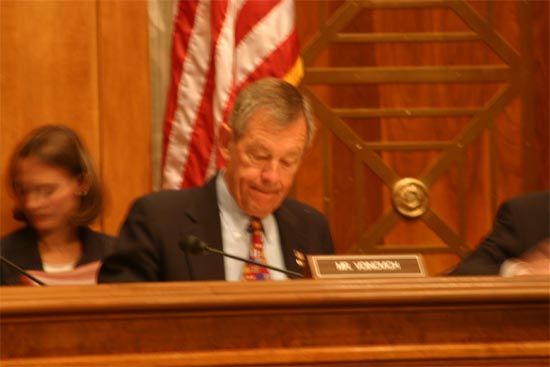
Senator Voinovich asks about host families and volunteer complaints
Senator Voinovich asked a question about the reliability of the host families that volunteers are going into and is there was a tendency to have a repetition of host families that continue to participate in the program year after year.
With regard to the first part of the question, the Director replied that host families are screened and evaluated country by country based on the procedures and processes in place taking into account the safety and security of the country.
With regard to how many families continue to participate in the Peace Corps program as host famiies over a period of years, the Director said that he did not have that specific information but would follow up with an answer.
The Senator followed up with a question about a story in the Dayton Daily News articles about a volunteer whose house had been broken into three times and he had complained about it to the Peace Corps and ultimately his house was broken into and he was murdered and asked the Director when the Peace Corps gets complaints like this, how fast do they respond to them.

Director Vasquez talks about the responsibility of Country Directors
The Director replied that he has made it very clear that his expectations for the job of Country Director are very high.
"I interview every Country Director one-on-one. They are my selection. And I make it very clear that they understand that I have expectations. That they understand that we are a volunteer based organization and that the volunteer is number one."
"If a volunteer has issues relative to safety or security where the fulfillment of the opportunity to deal with a Peace Corps volunteer is not being met, I have an expectation that the Country Director and staff will be responsive to that volunteer."
"My test is when a volunteer's work is disrupted, interrupted, or distracted, then we are not doing our job."
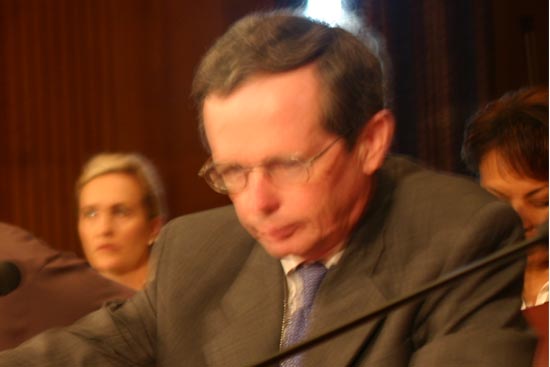
Jess Ford testifies about the GAO Report on Peace Corps Safety
Mr. Jess Ford, Director of International Affairs and Trade at the GAO was the next to testify and answer questions from the Senators.
When asked if there was anything inconsistent in Director Vasquez's testimony in terms of reporting the numbers of incidents he replied that the Peace Corps reports crimes in ten different categories.
"Some of them have gone down, some of them have remained about the same as where they have been for the past several years."
"When the Peace Corps started to track these cases in the early 1990's, in most cases these rates went upward but they have stabilized in the last few years," he added.
When asked by Senator Coleman about the steps that the Peace Corps had taken, he replied that "since the report came out the Peace Corps has implemented many of those suggestions. So overall we think that the Peace Corps has taken a lot of positive steps."
Mr. Ford was asked if the GAO recommended the independent appointment of the Peace Corps Inspector General and he replied that in general the GAO favored having the Inspector General be an independent appointment in each government agency. The GAO has not made a specific recommendation with regard to the IG at the Peace Corps but that they do believe that the IG should be independent.
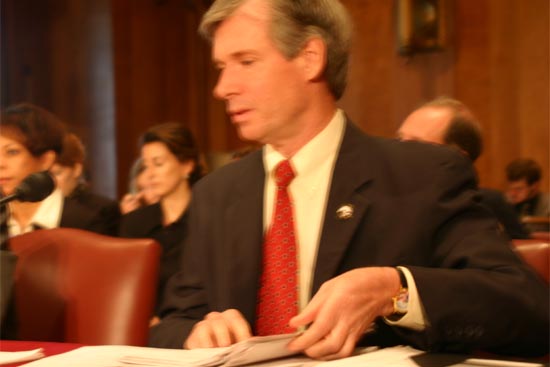
Kevin Quigley of the NPCA testifies about the poll taken of its membership
Kevin Quigley, President of the National Peace Corps Association, was the next to testify and talked about the NPCA and that there are 36,000 members affiliated to the 160 organizations in the NPCA network.
He said that the NPCA had conducted an online poll that over 250 members responded to and that 72% of those polled said they favored an ombudsman for the Peace Corps.
Mr. Quigley said that it was split 48% to 47% if Congress should statutorily establish an office of safety and security.
He said that 90% of the respondents opposed the pairing of volunteers, that respondents were equally split concerning the independent appointment of the Inspector General, and that 70% favored a study of the five year rule.
When asked if the respondents had favored the change in the five year rule that is part of this legislation, Mr. Quigley replied that that question had not been asked of the NPCA membership in the poll and that he did not have a response.
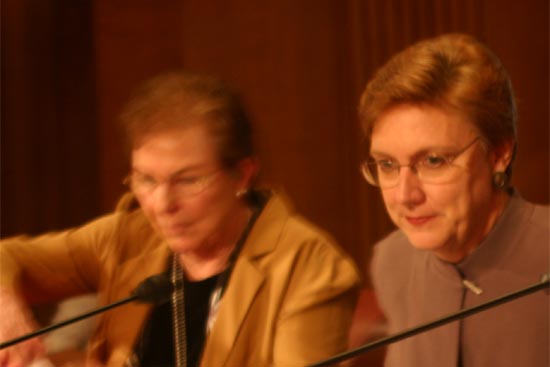
Ms. Cynthia Threlkeld and Ms. Gladys Maloy testify
Finally Ms. Cynthia Threlkeld (right), Peace Corps Country Director for Guatemala, and Ms. Gladys Maloy, a volunteer who recently completed her service in Romania each gave a statement and talked about how volunteers are integrated into their communities.
They added that volunteers don't like clustering of volunteers because volunteers like to get out on their own and it is a benefit to be one your own for learning the language and customs of the Country of Service.

PCOL asks Senator Coleman about volunteers he met working in AIDS Education
After the hearings were completed we talked to Senator Coleman and asked him about his trip last year to Africa with Senator Frist to look at the Global AIDS crisis and about his meetings with Peace Corps Volunteers in South Africa, Mozambique, and Botswana during his trip and his impression of the contribution being made by volunteers to AIDS education.
Senator Coleman said that he tries to meet with Peace Corps whenever he travels. He added that he thinks volunteers are doing phenomenal work.
He said that in conversations with volunteers he had been told very candidly how difficult it is to be a volunteer "not from a safety perspective but in just adjusting."
"I am extraordinarily proud of what the volunteers do and understand that it is extremely difficult. It is difficult to move away from home. to a different part of the world and face great challenges."
"Morale seemed to be very, very high though," he added.
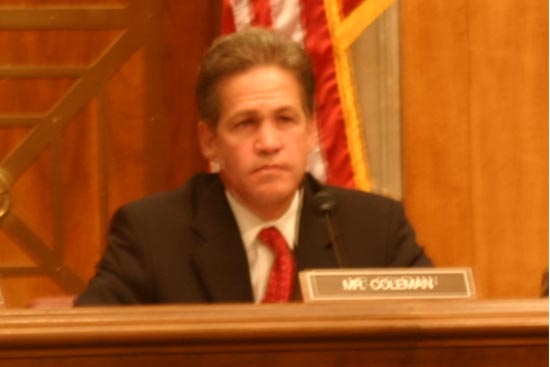
PCOL asks Senator Coleman about his views on the proposed bill
We asked Senator Coleman if he had made a determination on where he stands on the Peace Corps bill that is under consideration.
He replied that there are a couple of things that came out of these hearings. "We need to get some cost estimates," he said.
He added that he also wants to get some more feedback. "For example, it was clear today that one of the things that Senator Dodd raised was grouping people together and it was very clear from the testimony that the most important thing for safety is integration into the community."
"There shouldn't be a formula that simply says that if you are a single women, there should be someone with you so I am looking forward to getting some further information before I make a final judgment. We will work with the agency to do everything to guarantee that safety is a number one priority."

PCOL asks Senator Coleman about the Peace Corps FY05 budget
Finally we asked Senator Coleman if there was any reasonable possibility at this point that there could still be a substantial increase in the Peace Corps budget for FY05.
Senator Coleman replied that he was "not optimistic in getting the additional funds this year."
"Sometimes in this business it may take more than one year to get it done. But I am committed to making that happen and I believe it will happen, I just don't think we will get it done right away."
We thanked the Senator for his committment to the Peace Corps.
Click on a link below for more stories on PCOL
Read the series on Safety and Security here
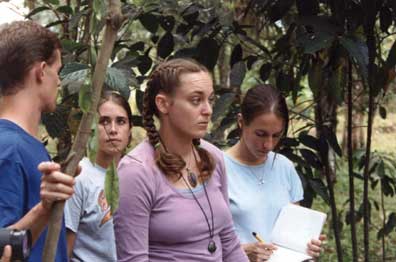
Leave your comments on the series below.
Read comments by RPCVs here, here and here.

Some postings on Peace Corps Online are provided to the individual members of this group without permission of the copyright owner for the non-profit purposes of criticism, comment, education, scholarship, and research under the "Fair Use" provisions of U.S. Government copyright laws and they may not be distributed further without permission of the copyright owner. Peace Corps Online does not vouch for the accuracy of the content of the postings, which is the sole responsibility of the copyright holder.
This story has been posted in the following forums: : Headlines; Congress; Legislation; Safety and Security of Volunteers
PCOL12045
76
.
- Victims of Safety Breaches at Peace Corps Friday, July 09, 2004 - 11:07 am [1]
- FECA, Peace Corps Safety and Health Monday, June 28, 2004 - 8:53 am [1]
- June 23, 2004: Headlines: Congress: Legislation: Safety and Security of Volunteers: Twin Cities Pioneer Press: Twin Cities Pioneer Press reports on Senate's Peace Corps Safety Hearings Wednesday, June 30, 2004 - 5:03 pm [2]
- June 23, 2004: Headlines: Congress: Legislation: Dayton Daily News: Dayton Daily News reports on Senate's Peace Corps Safety Hearings Wednesday, June 23, 2004 - 3:37 am [1]
- June 22, 2004: Headlines: Congress: Legislation: Miami Herald: Associated Press reports on Senate's Peace Corps Safety Hearings Wednesday, June 23, 2004 - 3:35 am [1]
- Archive Copy of Story Wednesday, June 23, 2004 - 3:11 am [1]
|
By Veterans (0-1pool116-179.nas7.somerville1.ma.us.da.qwest.net - 63.159.116.179) on Wednesday, June 23, 2004 - 12:10 pm: Edit Post |
In general, we want to thank the advocates for the Ombudsman's office. It is not exactly what we are seeking but it is a step in the right direction and an acknowledgement by the American people that Peace Corps Volunteers are important members of our nation and community.
We want to thank Senator Coleman, Senator Dodd and Senator Voinivich. These are the members that were present in the hearings.
We thank Mr. Poirier and his family for their contribution.
We want to thank Tony Hall.
We also want to thank the NPCA for their support too.
We want to thank Chairman Hyde (and Peter Smith, his staff person) and the other committee members for their support.
Also, anybody else who was not mentioned who contributed to this enabling legislation.
We support these parts of the Senate Bill:
1. Ombudsman Office
2. Independent Inspector General Office
We also support:
We advocate for volunteers not represented by the Peace Corps or the National Peace Corps Association.
Peace Corps Veterans Rights and Recognition of Service:
We Need America to recognize the achievements of all Volunteers who have served Peace Corps including volunteers who have had safety and health issues in or during service.
We support the following provisions of the proposed Peace Corps Health, Safety, and Security bill:
1. Ombudsman Office We support this effort as an alternative and a start.
2. Independent Inspector General Office (Support this measure)
Here are the rights and needs that need to be continually worked on for Peace Corps future.
As former Volunteers and with Safety and Health issues and especially wrongfully separated volunteers. We want a congressionally funded office of General Counsel for Volunteers only. (Though we don't speak for families of loved one who have persished in service, and we understand their frustrations with the agency. We know there is "no where to go" to get help during or after service that advocates soley for volunteers rights as an American citizen)
We want an establishment of a lawyer's office for Volunteer rights in service and Post service. We want an advocate who is congressionally mandated for volunteers families who have been victims of crimes, safety incidents, and current and post service health issues with the agency they served. Additionally we want advocates who work with these lawyers to assist volunteers and families. These advocates would ensure the memory and service of a volunteer is respected with memorials for volunteers who have passed or considered, in an missing or unknown status. These advocates would assist current and former volunteers with their rights under the laws of the agency and the United States government that a volunteer is guaranteed their rights post peace corps service with regards to health, safety and contested separation issues. These advocates would also assist in finding former volunteers with domestic violence and rape counseling centers to advocate on behalf of volunteers who have fallen victim to sexual incidents and crimes in service. Also, these advocates could be funded to assist volunteers and families with counsel and a place to go with their concerns related to service. These advocates could be authorized as crisis corps members, so they can help investigations of volunteers in crisis in given countries.
We also support the congress in further
A. Alternatives for volunteers who are not allowed to complete their service. This includes: Full readjustment allowance for volunteers officially or unofficially evacuated from their sites after a safety incident. This also includes a guarantee of being able to serve in the government without discrimation for thier service record. That is, getting points toward continued federal service, non competitive eligibility for federal positions, full participation in all scholarship programs administered by the government, and not discriminated against in private industry or with a NGO due to thier service record. This means in security clearence checks; your Peace Corps record can't be used against you due to a safety incident.
B.Full representation in the National Peace Corps Association for volunteers not allowed to complete their service. First two years free from dues.
C. Chaplains assigned to each country or regionally (including female chaplains for cultures where contact with males would be dangerous for female volunteers) to provide for the spiritual needs of volunteers, especially in the case of death or terminal illness of family members. That volunteers can leave without question for a two week visit in the case of brievement.
D. A medical service independent from the country director. Volunteers with given medical conditions be provided with funds for their needs in service without second guessing or alternatives in medical care.
E. An Indpendent review of due process for separated volunteers.
F. An Independent review funded and mandated by Congress to review all separations over the forty plus years for trends, whether former volunteers are signigantly serving the third goal, how many contrest their separations. How many were safety and health related. How many would join again if they were treated fairly. This would be interesting for Peace Corps recruiting and need for experience in the field. The GAO can be authorized to do this by the Committee. There has never been a poll done of the third goal and of former volunteers. This would be a start.
G. Cutting red tape for Peace Corps veterans with service related disabilities. This is area that must be explored further by the Congress. There have been numerous GAO reports on this subject and these Veterans are having tremendous amount of problems post Peace Corps. Currently, former voluteers with these issues are routinely cast off to the Department of Labor under FECA benefits. Peace Corps officials just stop answering the phone on these volunteers that have served. At the Department of Labor, a veteran has to deal with people and staffers unexperienced in what Peace Corps service is and they are unempathetic to their service. Also, currently the Department of Labor has been farming these cases out to insurance companies who often make the receipent of benefits start the process over or want a new diagnosis. This leaves the Veteran in a belaboring quandry and a burden on the families of Veterans. Military Veterans have rights and Peace Corps Veterans, really don't, they end up on their own. There are thousands of stories of Veterans fighting for survival due to their service. Many have to have a home office because of all the paper work involved. It becomes a full time job in becoming the Disabled Veteran of Peace Corps. Just ask these thousands how many files, three ring binders, file cabinets and fax machines you have to have to keep up with your claim? Ask about their telephone bill too? Ask how it affects their immediate family and the love ones around them? I have just heard one story of a volunteer who parents lost their home trying to help their veteran of the Peace Corps? Is this the right image for Peace Corps and our commitment to the program and to the veterans with disabilities and for that matter to the third goal? this is the shame of all of us.
H. Public acknowledgment of volunteers who are missing or die in service.
I. A permanant memorial for missing and fallen volunteers at Peace Corps or a neutral site
K. Memorial Plagues,Flags for coffins, Flags for grave sites related to Peace Corps service like the VFW, of volunteers who die in service
This is a collaborated effort of Former Volunteers who have had safety issue and evacutation concerns, friends of members of Separated Peace Corps Veterans and former Volunteers with Health and Disability issues. We don't represent all these volunteers but many have express themselves over the last year in e-mails, telephone calls, web site writings on Peace Corps online and through letters.
We are Peace Corps Veterans for Health, Safety, and Security
We advocate for volunteers not represented by the Peace Corps or the National Peace Corps Association.
|
By daniel (0-1pool152-108.nas16.somerville1.ma.us.da.qwest.net - 63.159.152.108) on Monday, June 28, 2004 - 8:44 am: Edit Post |
The same media attention that was given to safety and security issues should be brought forward for FECA Benefits or Volunteers who now have disabilities because of there Service.
As we have written, many GAO reports have been written, Peace Corps on line published a piece on this web site about Sara Evans ( it generated one of the longest discussions on the site I have seen), and there are thousands more than, than five thousand former volunteers in America today with coverage due to a service related injury.
Anybody who has health or safety issues with Peace Corps or FECA problems should call Senator Norm Coleman at 202-224-3121 ask for Lori Ann Woodrow.
The hill staffers think this problem has been "taken care of" according to a hill staffer. Remember, when the medical staff are rude or don't answewer your phone calls, you are the one's not "being taken care of". Remember the staff people at the department of Labor who farm your case out to an insurance case and then deny your benefits, "you are not being taken care of". The fact is that it has never been taken care of and needs to be looked at by Congress with real scrutiny.
They told us the Security issue was taken care of in 1999 and 2000. It was not true. Look at what the DDN discovered 2,800 cases of volunteers who had been counted but not served correctly. They are not telling the truth about FECA and disabilities and medical conditions either. The Hill staffers are listening to people like Steve Weinberg, who are not helping volunteers. Instead, they tell hill staffer's there is no problem, so there secure job is not scrutinized for programming issues.
You should also post you health situation on the web site hear. You can do it anonomymously.
call 202-224-3121
or call separated peace corps veterans at 978-462-3868.
Lets get health care, rehabilitation, and the rights we deserve due to our service with Peace Corps.
|
By daniel (63.159.121.64) on Monday, June 28, 2004 - 11:35 am: Edit Post |
Call Senator Coleman at 202-224-3121 ask for Lori Woodrow
I am unsure what the correct response to the concerns regarding safety and health is. But I wanted to add my own concern regarding this debate.
Peace Corps was one of the best experiences of my life, as it was for many others. One of the things that made it special for me was the fact that I was placed in a small rural village by myself, forcing me to immerse myself in a completely different culture. I had only two extremely brief visits from Peace Corps staff during my time and much of my first year was spent with little contact with other volunteers. This really enabled me to bond more with people in my village and "learn the language."
My hope is that others will be able to have similar opportunities to be on their own. My concern is that this debate about safety will result in a fundamental change in the kind of experiences Peace Corps Volunteers have had in the past.
- Mike Nelson (Ghana '97 - '99)
|
By daniel (0-1pool112-24.nas6.somerville1.ma.us.da.qwest.net - 63.159.112.24) on Friday, July 02, 2004 - 6:34 am: Edit Post |
I had a good experience too Mike. Until, I got threatened and if Peace Corps had handled it right and had handled many of these situations right we would not be getting into the programming issues of Peace Corps.
That is your experience and you had a good one. But that does not diminish other's experiences as well.
Much of the problem in this debate/new policy is the gap in experience, good experience vs Peace Corps experience with a safety or health issue (which in many other RPCV's world is "bad experience").
Call Senator Coleman's office anytime to express your safety and health issues. call the number above 202-224-3121 ask for Senator Coleman.
Especially call if Peace Corps won't ansewer your requests for health benefits under FECA. They (the House and Senate) think everyone is taken care of. We have to let them know the divide of experiences especially on the way Peace Corps handles these situations in health and safety.
You people with health and safety concerns call in.


























